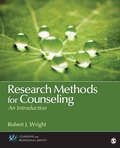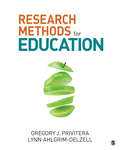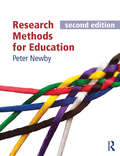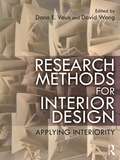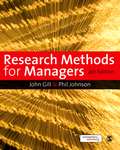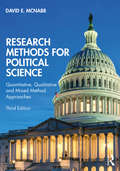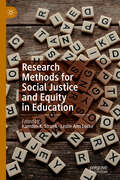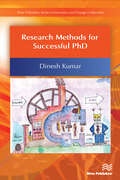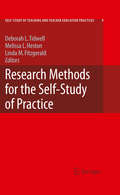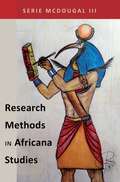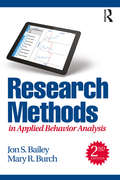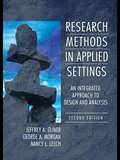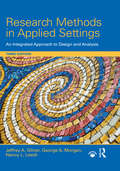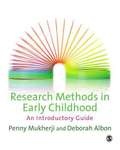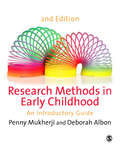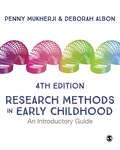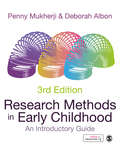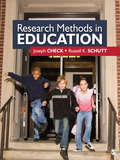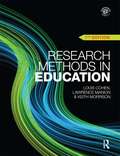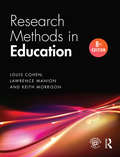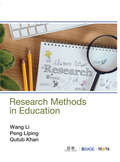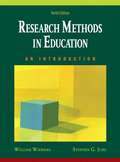- Table View
- List View
Research Methods for Counseling: An Introduction
by Robert J. WrightResearch Methods for Counseling: An Introduction provides a rich, culturally sensitive presentation of current research techniques in counseling. Author Robert J. Wright introduces the theory and research involved in research design, measurement, and assessment with an appealingly clear writing style. He addresses ways to meet the requirements of providing the data needed to facilitate evidence-based therapy and interventions with clients, and also explains methods for the evaluation of counseling programs and practices. This comprehensive resource covers a broad range of research methods topics including qualitative research, action research, quantitative research including, sampling and probability, and probability-based hypothesis testing. Coverage of both action research and mixed methods research designs are also included.
Research Methods for Education
by Lynn Ahlgrim-Delzell Gregory J. PriviteraFrom award-winning author Gregory J. Privitera and Lynn Ahlgrim-Delzell, Research Methods for Education covers the different quantitative and qualitative research methods specific to their use in educational research. This new text uses a problem-focused approach that fully integrates the decision tree—from choosing a research design to selecting an appropriate statistic for analysis. With a conversational, student-friendly writing style, and examples from a wide variety of education-related fields, the authors show how methods and statistics work together and enable the testing of hypotheses through use of the scientific method. Students will become informed consumers of research with the ability to understand a research article, judge its quality and apply the methods in action research to inform educational practice. Give your students the SAGE edge! SAGE edge offers a robust online environment featuring an impressive array of free tools and resources for review, study, and further exploration, keeping both instructors and students on the cutting edge of teaching and learning.
Research Methods for Education
by Lynn Ahlgrim-Delzell Gregory J. PriviteraFrom award-winning author Gregory J. Privitera and Lynn Ahlgrim-Delzell, Research Methods for Education covers the different quantitative and qualitative research methods specific to their use in educational research. This new text uses a problem-focused approach that fully integrates the decision tree—from choosing a research design to selecting an appropriate statistic for analysis. With a conversational, student-friendly writing style, and examples from a wide variety of education-related fields, the authors show how methods and statistics work together and enable the testing of hypotheses through use of the scientific method. Students will become informed consumers of research with the ability to understand a research article, judge its quality and apply the methods in action research to inform educational practice. Give your students the SAGE edge! SAGE edge offers a robust online environment featuring an impressive array of free tools and resources for review, study, and further exploration, keeping both instructors and students on the cutting edge of teaching and learning.
Research Methods for Education, second edition
by Peter NewbyResearch Methods for Education, Second Edition takes the student by the hand and guides them through the complex subject of research methods in an engaging, witty and clear way. The book covers the philosophical approaches and epistemology, as well as the practical aspects of research, such as designing questionnaires and presenting conclusions. Each chapter is split into 'Context' and 'Practice' and both sections are packed with exercises, examples and comparative international material from other educational contexts, Peter Newby's book is the student-friendly text which demystifies the research process with clarity and verve. Key features: -written in a clear and friendly manner to help students feel more confident dealing with the complexities of research and particularly useful for those new to research or less confident with numbers -a mixed methods approach, which doesn't simply prioritise quantitative or qualitative methods, allowing for greatest possible coverage contains guidance on analytic procedures that require more advanced tools such as SPSS and Minitab -many excellent international examples and case studies specifically from education, which breaks away from a parochial focus on UK education system.
Research Methods for Interior Design: Applying Interiority
by Dana E. VauxInterior design has shifted significantly in the past fifty years from a focus on home decoration within family and consumer sciences to a focus on the impact of health and safety within the interior environment. This shift has called for a deeper focus in evidence-based research for interior design education and practice. Research Methods for Interior Design provides a broad range of qualitative and quantitative examples, each highlighted as a case of interior design research. Each chapter is supplemented with an in-depth introduction, additional questions, suggested exercises, and additional research references. The book’s subtitle, Applying Interiority, identifies one reason why the field of interior design is expanding, namely, all people wish to achieve a subjective sense of well-being within built environments, even when those environments are not defined by walls. The chapters of this book exemplify different ways to comprehend interiority through clearly defined research methodologies. This book is a significant resource for interior design students, educators, and researchers in providing them with an expanded vision of what interior design research can encompass.
Research Methods for Managers
by John Gill Phil Johnson Murray ClarkThird Edition of Bestselling Textbook `With its comprehensive coverage, clear, logical structure and lucid, accessible writing style, this masterful introduction to management research sets a standard others will find hard to emulate. A highly informative "must buy", I strongly recommend this text as essential reading for all engaged in research in management. ' - Peter L Jennings, University of Southampton, School of Management `John Gill and Phil Johnson have written a text which is necessary reading for management students. But it is even more necessary reading for those managers - both of the student and/or practising variety - who in their search for a coherent and hard identity have chosen to see themselves as men and women of action rather than theorisers'-Alex Weich, Westminster Business School `Gill and Johnson do a first class job of interpreting and personalising the mystique of research in business and management. The new edition of their book offers a wealth of detail encompassing all aspects of research in practice [with] real insights into the process of selecting a research approach and the practical, philosophical and methodological implications that ensue. The authors well-grounded experience shows throughout the work injecting a much needed dose of realism. The result is a well-balanced treatment of the crucial issues in management research. As I was reading through the work, I found myself challenging my own research perceptions and approaches. I personally rate it as a real gem. A must for the questioning research student (and the professional researcher)' - Darren Dalcher, Head of Software Forensics Centre, Middlesex University The new and updated Third Edition of this bestselling introductory text: - Is even more practical and easy to use for students with exercises & an up to date glossary of terms - Provides new and updated examples of management research in practice - Uses detailed examples drawn from published management research to illustrate issues and methodologies - Provides in-depth suggestions for further reading at the end of each chapter - Provides a sound basis and will continue to assist students at first degree, diploma, MBA or Doctorate level. The authors address key philosophical matters that are fundamental to any real understanding of the methodological approaches to management research. They challenge the advocacy of some methods over others, pointing out the advantages and disadvantages of different methods according to the kinds of data they afford. Research Methods for Managers enables students to take their first steps in project work, confident that they are on firm ground in their choice of methodological approaches.
Research Methods for Political Science: Quantitative, Qualitative and Mixed Method Approaches
by David E. McNabbThe third edition of Research Methods for Political Science retains its effective approach to helping students learn what to research, why to research and how to research. The text integrates both quantitative and qualitative approaches to research in one volume and covers such important topics as research design, specifying research problems, designing questionnaires and writing questions, designing and carrying out qualitative research and analyzing both quantitative and qualitative research data. Heavily illustrated, classroom tested, exceptionally readable and engaging, the text presents statistical methods in a conversational tone to help students surmount "math phobia." Updates to this new edition include: Research topics chapters have been upgraded and expanded. Two mixed methods design chapters have been added. A new chapter on hermeneutic analysis designs and research with large data sets. The chapter on multivariate statistics has been expanded, with an expanded discussion on logistic regression. Tools on how to prepare and present research findings are now featured in the appendix, allowing instructors more flexibility when teaching their courses. Research Methods for Political Science will give students the confidence and knowledge they need to understand the methods and basics skills for data collection, presentation and analysis.
Research Methods for Social Justice and Equity in Education
by Kamden K. Strunk Leslie Ann LockeThis textbook presents an integrative approach to thinking about research methods for social justice. In today's education landscape, there is a growing interest in scholar-activism and ways of doing research that advances educational equity. This text provides a foundational overview of important theoretical and philosophical issues specific to this kind of work in Section I. In Section II, readers engage with various ways of thinking about, collecting, and analyzing data, including qualitative, quantitative, and mixed methods approaches. Finally, in Section III, through case studies and research narratives, readers will learn about real scholars and their work. This book takes a wide-ranging approach to ways that various modalities and practices of research can contribute to an equity mission.
Research Methods for Successful PhD
by Dinesh KumarA PhD is the start of the research careers, and these students are the backbone of Universities and research institutions. It is the opportunity for youthful energy and creativity to make global impact and train the future researchers to make a difference. However, the candidature can also be the period of confusion and regret because of lack of structure and understanding.Research Methods for Successful PhD is written to help the PhD students and other young researchers navigate their path through this phase that will give them a direction and purpose. It is a candid conversation and developed over the experience of supervising 30 research students and publishing 400 papers over 20 years. The book recognizes that every student is different and has unique circumstances. It teases out the fundamental questions that we forget to ask, the method of relating to the supervisor, discusses methods to improve communication skills and explains the how to get the work published.
Research Methods for the Self-Study of Practice
by Deborah Tidwell Melissa Heston Linda FitzgeraldThis volume presents 13 studies that provide concrete and authentic illustrations of self-study as it naturally unfolds across different educational settings. Each chapter provides in-depth descriptions of the context, method choices and processes used for self-study research, highlighting how researchers gather, analyze and make sense of data. All of these studies offer rich examples of the recursive processes so important in self-study research. The first section highlights the use of text as data to examine the meaning and value of teacher education practices. The second features self-studies using discourse and dialogue as data and often as actual analysis tools for examining practice. The third presents studies in which different forms of visual representations are used as data that illuminate the ideas, assumptions and experiences underlying practice. The final section presents self-studies focused on the impact of practice on teacher education programs, students, and faculty-student interactions.
Research Methods in Africana Studies
by Serie McDougalResearch Methods in Africana Studies is a major contribution to the discipline of Africana studies and social science involving people of African descent in general. This textbook is the first of its kind, offering instruction on how to conduct culturally relevant critical research on Africana communities in the American context, in addition to the African diaspora. It contains a collection of the most widely used theories and paradigms designed for exploring, explaining, and advancing Africana communities through science. The relevance, strengths, and weaknesses of every major method of data collection are explained as they relate to the lived experiences of the Black world. It stands alone as the only textbook that details empirical methods in the service of the collective advancement of Africana peoples.
Research Methods in Applied Behavior Analysis (2nd Edition)
by Jon S. Bailey Mary R. BurchResearch Methods in Applied Behavior Analysis, 2nd edition, is a practical text that provides the beginning researcher with a clear description of how behavior analysts conduct applied research and submit it for publication. In a sequence of ten logical steps, the text covers the elements of single-case research design and the practices involved in organizing, implementing, and evaluating research studies. This revision includes new material on how to critique a journal article and how to extract treatment ideas from published studies. The novice researcher receives a "steps for success" approach that is brief, useful, to the point, and clearly delineated.
Research Methods in Applied Settings
by George A. Morgan Jeffrey A. Gliner Nancy L. LeechThrough its integrated approach to quantitative research methods, this text teaches readers how to plan, conduct, and write a research project and select and interpret data so they can become better consumers of research. This is not a statistics book--there are very few formulas. Rather, this book helps students master which statistic to use when and how to interpret the results. Organized around the steps one takes in conducting a research project, this book is ideal for applied programs and for those who want to analyze and evaluate research articles. Having taught in a variety of departments, the authors have a good grasp of the research problems faced by master's and doctoral students in diverse areas of the behavioral and social sciences. Text adopters applaud the book's clarity. Students are often confused by other texts' use of inconsistent terminology. To avoid this confusion, the authors present a semantically consistent picture that emphasizes five research approaches-- randomized experimental, quasi-experimental, comparative, associational, and descriptive. The authors then show how these approaches lead to three kinds of research designs which, in turn, lead to three groups of statistics with the same names. This consistent framework increases comprehension and the ability to apply the material. Numerous applied problems, annotated examples, and diagrams and tables further promote comprehension. Although the book emphasizes quantitative research, the value of qualitative research is introduced. This extensively revised edition features more than 50% new material including: A new chapter on the evidence-based approach that emphasizes the importance of reporting confidence intervals and effect sizes and the increased use of meta-analysis. An increased emphasis on evaluating research including an 8 step plan for evaluating research validity (Chs. 23 & 24) and its application to the 5 sample studies used throughout the book (Ch. 25). Lots of practical advice on planning a research project (Ch. 2), data collection and coding (Ch. 15), writing the research report (Ch. 27), questions to use in evaluating a research article (Appendix E) and creating APA tables and figures (Appendix F). A new chapter on non-experimental approaches/designs (Ch. 7) including qualitative research. Web resources for students including critical thinking problems with answers and a sample outline of a research proposal. An earlier and expanded introduction to measurement reliability and validity to further emphasize their differences and importance. An extensively revised chapter on measurement validity consistent with the latest APA/AERA/NCME standards. Fewer chapters on inferential statistics with an increased focus on how their selection is related to the design of the study and how to interpret the results using significance testing and effect sizes and confidence intervals. Instructor's Resources with Power Points, test questions, answers to the application questions, and more. Intended for graduate research or quantitative/experimental methods/design courses in psychology, education, human development and family studies, and other behavioral, social, business, and health sciences, independent sections and chapters can be read in many orders allowing for flexibility in assigning topics. Due to its practical approach, this book also appeals to researchers and clinicians. Prior exposure to statistics and research methods is recommended.
Research Methods in Applied Settings: An Integrated Approach to Design and Analysis, Third Edition
by George A. Morgan Jeffrey A. Gliner Nancy L. LeechThis text teaches readers how to plan, conduct, and write a research project and select and interpret data through its integrated approach to quantitative research methods. Although not a statistics book, students learn to master which technique to use when and how to analyze and interpret results, making them better consumers of research. Organized around the steps of conducting a research project, this book is ideal for those who need to analyze journal articles. With teaching experience in various departments, the authors know how to address the research problems faced by behavioral and social sciences students. Independent sections and chapters can be read in any order allowing for flexibility in assigning topics. Adopters applaud the book’s clarity and applied interdependent approach to research. The book emphasizes five research approaches: randomized experimental, quasi-experimental, comparative, associational, and descriptive. These five approaches lead to three kinds of research designs which lead to three groups of statistics with the same names. This consistent framework increases comprehension while avoiding confusion caused by inconsistent terminology. Numerous examples, diagrams, tables, key terms, key distinctions, summaries, applied problems, interpretation questions, and suggested readings further promote understanding. This extensively revised edition features: More examples from published research articles to help readers better understand the research process. New Research in the Real World boxes that highlight actual research projects from various disciplines. Defined key terms in the margins and interpretation questions that help readers review the material. More detailed explanations of key concepts including reliability, validity, estimation, ethical and bias concerns, data security and assumptions, power analysis , and multiple and logistic regression. New sections on mediation and moderation analysis to address the latest techniques. More coverage of quasi-experimental design and qualitative research to reflect changing practices. A new appendix on how to write about results using APA guidelines to help new researchers. Online resources available at www.routledge.com/9781138852976 that provide instructors with PowerPoints, test questions, critical thinking exercises, a conversion guide, and answers to all of the book’s problems and questions. Students will find learning objectives, annotated links to further readings and key concepts, and key terms with links to definitions. Intended for graduate research methods or design or quantitative/experimental research methods courses in psychology, education, human development, family studies, and other behavioral, social, and health sciences, some exposure to statistics and research methods is recommended.
Research Methods in Early Childhood
by Penny Mukherji Deborah Albon'How I wish I'd had a book like this when I first started my career as a researcher into early years education and care! There's something for everyone, and I wholeheartedly commend it to those embarking upon, or wishing to extend their knowledge of, early childhood research; - Professor Emeritus Janet Moyles, Early Years & Play Consultant 'This text covers an excellent range of issues. In particular, the mix of academic background to topics and practical application will make it an excellent resource for students' - Damien Fitzgerald, Principal Lecturer in Early Childhood Studies, Sheffield Hallam University This highly engaging and easy-to-read introductory text is tailored to meet the needs of early childhood students. It includes practical examples of research with and about young children and babies, and encourages the reader to take an interactive approach. By offering clear guidance on research methods, as well as advice on how to develop skills as a researcher, the book takes students step-by-step through the process of doing a research project and provides a detailed grounding in the subject. The book covers: - an introduction to research methodology - various approaches to research, including action research - designing a questionnaire - carrying out observations and interviews - undertaking a piece of independent research from start to finish - understanding and critiquing the research of others - ethical issues in early childhood research - real life examples of how to tackle different aspects of research The authors break down the content into four main sections: Paradigms and Principles; Approaches to Research; Methods; Carrying out a Research Project. Each chapter contains learning objectives, case studies, research in focus sections, reflection points, a summary and suggestions for further reading. The language used throughout is accessible, and a full glossary of terms is included. This book is indispensible for all students undertaking research in early childhood. Penny Mukherji and Deborah Albon are both Senior Lecturers in Early Childhood Studies at London Metropolitan University.
Research Methods in Early Childhood: An Introductory Guide
by Penny Mukherji Deborah AlbonPacked full of even more examples of research methods in practice, this second edition now comes with a fantastic website giving you all you need to understand research methods in early childhood. With new case studies and reflective tasks throughout, this bestselling textbook covers all you need to know about undertaking research in early childhood, including action research, ethics and doing your research project. Online, you'll find: - Quizzes to test your methods knowledge - Free journal articles with accompanying activities to broaden understanding and develop critical thinking - Useful web links as well as videos of the authors answering FAQs about research If you are undertaking research in early childhood then this book is for you.
Research Methods in Early Childhood: An Introductory Guide
by Penny Mukherji Deborah AlbonResearch methods is a challenging topic for many students. When you are new to research you need a step-by-step guide which introduces the subject area in a clear and accessible way. This book does exactly that. Designed with the early childhood student in mind, this book is the companion to your research journey. Following a progressive structure this book leads you logically through the processes needed to design and carry out meaningful and ethical research. This Fourth Edition includes: Two new chapters, separating out quantitative data analysis and qualitative data analysis A reader guide at the beginning of the book to aid navigation. Research in Focus boxes, which introduce you to real world examples of international research Activities to help cement knowledge and understanding. Case Studies which describe examples and scenarios of real student research, which demonstrate best practice and show how to present findings. An extended glossary to support readers in learning complicated terminology. Online resources complement this new edition, offering valuable resources for instructions and students including: Author videos, offering tips and explanations. Flashcard glossary to consolidate learning MCQs to test understanding Free journal articles for wider reading PowerPoint slides
Research Methods in Early Childhood: An Introductory Guide
by Penny Mukherji Deborah AlbonResearch methods is a challenging topic for many students. When you are new to research you need a step-by-step guide which introduces the subject area in a clear and accessible way. This book does exactly that. Designed with the early childhood student in mind, this book is the companion to your research journey. Following a progressive structure this book leads you logically through the processes needed to design and carry out meaningful and ethical research. This Fourth Edition includes: Two new chapters, separating out quantitative data analysis and qualitative data analysis A reader guide at the beginning of the book to aid navigation. Research in Focus boxes, which introduce you to real world examples of international research Activities to help cement knowledge and understanding. Case Studies which describe examples and scenarios of real student research, which demonstrate best practice and show how to present findings. An extended glossary to support readers in learning complicated terminology. Online resources complement this new edition, offering valuable resources for instructions and students including: Author videos, offering tips and explanations. Flashcard glossary to consolidate learning MCQs to test understanding Free journal articles for wider reading PowerPoint slides
Research Methods in Early Childhood: An Introductory Guide
by Penny Mukherji Dr Deborah AlbonResearch is something many Early Childhood Studies students struggle with; for many it’s intimidating and something 'other people' do. When we asked the authors what common problems students struggle with they said: Students find it hard to understand research methodology and theoretical frameworks within which to conduct research Sometimes students struggle to come up with an appropriate research design Students often find it hard to come up with precise research questions Analysing research data and presenting it clearly for the reader are also areas students find difficult As a result, the authors have designed this book with their early childhood student in mind to help them through the research process. The book covers the whole research journey both in terms of understanding the different methodologies & principles and in actually undertaking a research project. It follows a linear and progressive structure that logically helps students work through their course. In this new edition, the chapters have been reorganized to better suit the learning journey and a brand new reader guide to research at the start of the book has been added to aid navigation. A new chapter on research proposals as well as more on alternative ways of presenting research have also been added. The book assumes no prior knowledge and really introduces the topics to beginners in simple terms. The supportive writing style and the way difficult concepts are clearly explained is often feedback we hear from both lecturers and students. Once students have gained confidence, they are able to delve into the further reading suggestions and the topics and content covered extend into enough depth for those who want to go further in their studies. This means students really can use it throughout their whole course. Research in Focus boxes look at international published examples of research to show what it looks like in the real world and understand the effects and implications. (Countries covered are USA, Canada, Scotland, Northern Ireland, Republic of Ireland, England, Norway, Sweden, Finland, France, Italy, Belgium, South Africa, India, Singapore, Australia & New Zealand.) Activities for students to work through help them cement knowledge and understanding. Case Studies give examples and scenarios of real student research. These demonstrate best practice and show students how to present their findings in a way that conveys the decisions they have made in their own personal style rather than rather than regurgitating textbooks. Extended glossary which gets students familiar with complicated terminology. . This new Third Edition includes: Videos pre-chapter relating to chapter outcomes Flashcard glossary to consolidate learning MCQs to test understanding Penny Mukherji and Deborah Albon will be discussing ideas from Research Methods in Early Childhood in the SAGE Early Years Masterclass, a free professional development experience hosted by Kathy Brodie. To sign up, or for more information, click here.
Research Methods in Early Childhood: An Introductory Guide
by Penny Mukherji Dr Deborah AlbonResearch is something many Early Childhood Studies students struggle with; for many it’s intimidating and something 'other people' do. When we asked the authors what common problems students struggle with they said: Students find it hard to understand research methodology and theoretical frameworks within which to conduct research Sometimes students struggle to come up with an appropriate research design Students often find it hard to come up with precise research questions Analysing research data and presenting it clearly for the reader are also areas students find difficult As a result, the authors have designed this book with their early childhood student in mind to help them through the research process. The book covers the whole research journey both in terms of understanding the different methodologies & principles and in actually undertaking a research project. It follows a linear and progressive structure that logically helps students work through their course. In this new edition, the chapters have been reorganized to better suit the learning journey and a brand new reader guide to research at the start of the book has been added to aid navigation. A new chapter on research proposals as well as more on alternative ways of presenting research have also been added. The book assumes no prior knowledge and really introduces the topics to beginners in simple terms. The supportive writing style and the way difficult concepts are clearly explained is often feedback we hear from both lecturers and students. Once students have gained confidence, they are able to delve into the further reading suggestions and the topics and content covered extend into enough depth for those who want to go further in their studies. This means students really can use it throughout their whole course. Research in Focus boxes look at international published examples of research to show what it looks like in the real world and understand the effects and implications. (Countries covered are USA, Canada, Scotland, Northern Ireland, Republic of Ireland, England, Norway, Sweden, Finland, France, Italy, Belgium, South Africa, India, Singapore, Australia & New Zealand.) Activities for students to work through help them cement knowledge and understanding. Case Studies give examples and scenarios of real student research. These demonstrate best practice and show students how to present their findings in a way that conveys the decisions they have made in their own personal style rather than rather than regurgitating textbooks. Extended glossary which gets students familiar with complicated terminology. . This new Third Edition includes: Videos pre-chapter relating to chapter outcomes Flashcard glossary to consolidate learning MCQs to test understanding Penny Mukherji and Deborah Albon will be discussing ideas from Research Methods in Early Childhood in the SAGE Early Years Masterclass, a free professional development experience hosted by Kathy Brodie. To sign up, or for more information, click here.
Research Methods in Education
by Russell K. Schutt Joseph W. CheckResearch Methods in Education introduces research methods as an integrated set of techniques for investigating questions about the educational world. This lively, innovative text helps students connect technique and substance, appreciate the value of both qualitative and quantitative methodologies, and make ethical research decisions. It weaves actual research "stories" into the presentation of research topics, and it emphasizes validity, authenticity, and practical significance as overarching research goals.The text is divided into three sections: Foundations of Research (5 chapters), Research Design and Data Collection (7 chapters), and Analyzing and Reporting Data (3 chapters). This tripartite conceptual framework honors traditional quantitative approaches while reflecting the growing popularity of qualitative studies, mixed method designs, and school-based techniques. This approach provides a comprehensive, conceptually unified, and well-written introduction to the exciting but complex field of educational research.
Research Methods in Education
by Louis Cohen Lawrence Manion Keith MorrisonThis rewritten, expanded and updated 7th edition of the long-running bestseller Research Methods in Education encompasses the whole range of methods currently employed by educational research at all stages. It offers plentiful and rich practical advice, underpinned by clear theoretical foundations, research evidence and up-to-date references. Chapters new to this edition cover: Causation, critical educational research, evaluation and the politics of research, including material on cross-cultural research, mixed methods and participatory research Choosing and planning a research project, including material on sampling, research questions, literature reviews and ethical issues Meta-analysis, research syntheses and systematic reviews Virtual worlds and internet research Using and analysing visual media and data in educational research Organizing and presenting qualitative data, content analysis, coding and computer analysis, themes, narratives, conversations and discourses, grounded theory Understanding and choosing statistical tests, descriptive and inferential statistics, multi-dimensional measurement and factor analysis Research Methods in Education is essential reading for both the professional researcher and students of education at undergraduate and postgraduate level, who need to understand how to plan, conduct, analyse and use research. The textbook is accompanied by a website: www.routledge.com/textbooks/cohen7e. PowerPoint slides for every chapter contain an outline of the chapter structure followed by a thorough summary of the key points, ideal for both lecturers and students. Within the book a variety of internet resources are referred to and these references have been included here, with links to the websites. A wide range of supplementary documents are available for many chapters, providing additional guidance and examples. They range from guidelines for the contents of a research proposal with a worked example, to screen-print manuals for using SPSS and QSR N6 NUD*IST (exportable to N-Vivo) plus data files.
Research Methods in Education
by Louis Cohen Lawrence Manion Keith MorrisonThis thoroughly updated and extended eighth edition of the long-running bestseller Research Methods in Education covers the whole range of methods employed by educational research at all stages. Its five main parts cover: the context of educational research; research design; methodologies for educational research; methods of data collection; and data analysis and reporting. It continues to be the go-to text for students, academics and researchers who are undertaking, understanding and using educational research, and has been translated into several languages. It offers plentiful and rich practical advice, underpinned by clear theoretical foundations, research evidence and up-to-date references, and it raises key issues and questions for researchers planning, conducting, reporting and evaluating research. This edition contains new chapters on: Mixed methods research The role of theory in educational research Ethics in Internet research Research questions and hypotheses Internet surveys Virtual worlds, social network software and netography in educational research Using secondary data in educational research Statistical significance, effect size and statistical power Beyond mixed methods: using Qualitative Comparative Analysis (QCA) to integrate cross-case and within-case analyses. Research Methods in Education is essential reading for both the professional researcher and anyone involved in educational and social research. The book is supported by a wealth of online materials, including PowerPoint slides, useful weblinks, practice data sets, downloadable tables and figures from the book, and a virtual, interactive, self-paced training programme in research methods. These resources can be found at: www.routledge.com/cw/cohen.
Research Methods in Education
by Wang Li Peng LipingThis book provides students with a sound theoretical understanding along with the practical knowledge and skills needed to carry out independent research in the field of education. Designed to introduce students to the process of scientific research in education, Research Methods in Education goes beyond explaining the methods of empirical data collection and analysis. It encourages students and researchers to contextualise their knowledge and understanding of quantitative and qualitative research designs by drawing links between the research question and the underlying theoretical framework. This book identifies key research methodologies, data collection tools (e.g., sampling and hypotheses testing), and data analysis methods, and focuses on the comparisons between them. Each chapter highlights the strengths and weaknesses of the key research methods. Key Features: Numerous examples interspersed throughout the text exemplify the role of educational research in educational policy making across the globe. Each chapter comprises robust pedagogical features including short examples, detailed case studies, lists of key terms and suggested readings, and so on. Self-test exercises are spread throughout the text to aid understanding and easy-recollection of the topics learnt. Demonstrates the importance and ideal sequence of each of the research activities.
Research Methods in Education: An Introduction (9th Edition)
by William Wiersma Stephen G. JursA classic in its field, Research Methods in Education explains the research process with emphasis on the formulation of a research question, referencing current literature in the field, using appropriate research designs, and writing and evaluating research reports. Both quantitative and qualitative research designs are described. Measurement, sampling, and statistics are presented as essential research tools. Retaining the clear, concise writing style and organization that has made this text so popular,Research Methods in Education helps students evaluate research literature as well as master research methodology. It emphasizes the rationale for commonly used research procedures and their applications. The authors outline the nature of educational research and clearly define the steps in the research process. The text is broad in scope-covering both quantitative, qualitative and mixed methods research methodologies as well as describing how to write research proposals and reports of completed research. Research Methods in Education gives students a solid understanding of all the elements of research.
